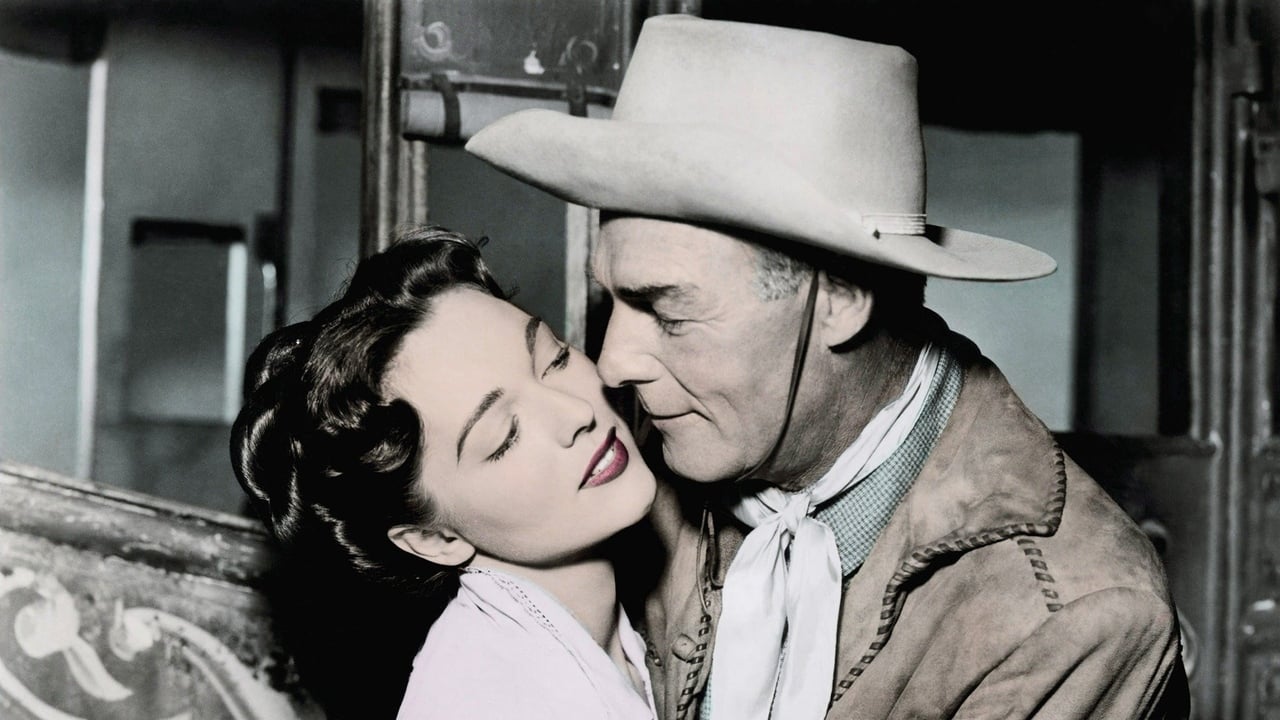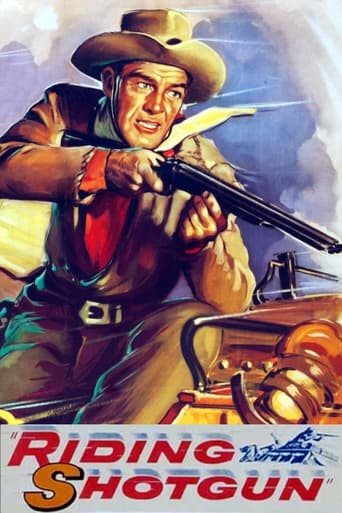

it is the rare 'crazy' movie that actually has something to say.
... View MoreGo in cold, and you're likely to emerge with your blood boiling. This has to be seen to be believed.
... View MoreEach character in this movie — down to the smallest one — is an individual rather than a type, prone to spontaneous changes of mood and sometimes amusing outbursts of pettiness or ill humor.
... View MoreOk... Let's be honest. It cannot be the best movie but is quite enjoyable. The movie has the potential to develop a great plot for future movies
... View MoreRecognized in its day as two or three cuts above your standard western entertainment, Riding Shotgun has lost little of its original appeal. True, the characters are one-dimensional – and Randolph Scott is no longer the hero he once seemed to be – but the story – obviously influenced by High Noon – gains tautness by its likewise insistence in observing the Greek unities of time, place and plot. It's also very capably acted by some familiar figures like Joe Sawyer and Fritz Feld and some not so familiar at the time like Charles Bronson (in a small role as the memorable Pinto). Both director Andre de Toth and photographer Bert Glennon make good use of tracking shots, overhead angles and tight compositions which reinforce the nervy small-town atmosphere. Music (David Buttolph) and art direction (Edward Carrere) also well serve the director's ends in creating a mood of high tension, power and suspense.
... View MoreAnother Randolph Scott vehicle; and it's pretty lame from the outset. He's a stage-coach guard who is kidnapped by a gang and left for dead. When he gets back to town, most everyone suspects him of being in cahoots with the baddies. So why would he go back to town by himself and risk arrest or lynching? Don't ask.What follows then is a wobbly wander through most every western cliché of the period as he falls foul of one citizen or another. The townfolk vacillate over what to do. The deputy isn't sure. Scott's character claims that the baddies are actually going to rob the town (its bank and casino) nobody buys that either.It's a pretty slow, often boring and confused plot that gradually shuffles along. There's a lot of guff about him getting a horse to ride out and warn the absent sheriff and posse. But he can't get one. A cowboy in a wezzie who can't get a horse?! For an interim he is holed-up in a small bar and on 3 separate occasions, a decent deputy turns up to talk him into surrender.In due course the gang turns up at the bank. Despite his earlier warning, nobody even sees them arrive. He gets there; there's a clumsy shoot-em-up. All is understanding and forgiveness thereafter. I'd have thought his being at the bank during its hold-up actually consolidated his guilt - but there you are.There's nothing much to recommend it. A youthful Charles Bronson makes an appearance as a baddie. That's about it.Scott made some memorable westerns in his time, he did precious little else. Perhaps inevitably then, he made a few bummers. 'The Man From Lamarie' was another. Thank heavens John Sturges came to town. And also John Wayne.
... View MoreAndré De Toth's brisk 74 minute western "Riding Shotgun" is an ambitious, above-average Randolph Scott horse opera that stands out from the herd. The trigger-happy outlaws here are a downright dastardly bunch; the townspeople turn into a moronic mob, and the hero creates more trouble for himself because of this credulous mob that refuse to believe him. Literally, Scott becomes the cowboy who cried wolf as far as the citizens are concerned.Seasoned western scenarist Thomas Blackburn and De Toth have fashioned Kenneth Perkins' novel "Riding Solo" into a first-rate, suspenseful sagebrusher that never lets up on its surprises. Moreover, "Riding Shotgun" illustrates De Toth's obsession with realism. The Marady gang's decoy strategy, the act of cinching a saddle onto a horse, the use of a derringer to blast the ropes off the hero's wrists, and actions of a mob that intensify without reason keep things lively in this slam-bang shoot'em up. For example, early in the action, heroic Larry DeLong (Randolph Scott of "Colt .45") has to get a horse to follow a man who may lead him to his sworn enemy Dan Marady. Instead of simply getting an already saddled mount and swinging astride, De Toth shows Delong actually taking the time to cinch the saddle to its' back. As is the case in many De Toth films, we see the heroes and villains actually doing thingslike saddling a horsethat other directors would eliminate as time-consuming and mundane. However, this is a set-up that De Toth pays off later when Delong sabotages the outlaw gang's departure by slicing through the cinches on their saddles so that they will bite the dust when they try to step aboard their p0nies.De Toth and Blackburn allow the Randolph Scott character to narrate the picture so as to push the plot ahead and plant in our minds the very personal nature of Delong's revenge. The movie opens with Delong riding atop a stage coach as the shotgun messenger while Scott provides voice-over narration that brings the action quickly up to speed."For three years I dedicated every waking moment of my life to scouring the frontier for a killer for a very personal reason. I'd worked at all kinds of jobs from Wyoming to Oregon. In the last year, I'd working every stage line between Canada and Mexico, riding shotgun. I knew that sooner or later my path would again cross that of the man I wantedDan Marady." No sooner has Delong furnished this exposition and the stage coach rumbled past the camera than infamous Dan Marady (James Mullican of "Winchester '73") descends from the top of the pass that the stage just driven by and sends an old-timer off to the stage relay station to snooker Delong. Marady lives up to Delong's description: "as clever as he is ruthless and always managed to escape capture." Delong doesn't want to capture Marady; however, he means to kill him for the shooting deaths of his sister and his nephew. Consequently, from the outset, the hero has a strong motive to slay the villain. That makes for good drama! Anyway, Marady wants to rob the stage coach that Delong is guarding. To lure Delong away from the stage, he sends an old-timer into the relay station with his (Marady's) lucky charm derringer. At the station, Delong gets the shock of his life when he sees Marady's lucky derringer. He quits the stage coach to find out where the old-timer got the derringer and gets himself jumped and hogtied by Pinto ("The Great Escape's" Charles Bronson back when he was Buchinsky) and the rest of Marady's gang.Marady's gang stops the coach, take the strong box, shoots up the passengers (but doesn't kill anybody) and sends the riddled stage coach off to Deepwater where the citizens take the law seriously. The outlawsprincipally Pintomistakenly share their devious strategy with Delong who warns them about the law and order imperative of Deepwater and its stern sheriff Buck Curlew. As it turns out, Marady is counting on the zealous law and order attitude of Deepwater. He plans to let the shot-up stage careen into town. Curlew and a posse will light out after them, but they won't know that they are chasing a herd of horses instead of Marady. Meanwhile, the Marady gang will rob the Bank Club, a gambling house, and escape without harm with loot. Unfortunately, for Marady and company, Delong escapes by shooting his ropes with Marady's derringer that the old-timer dropped by accident. When Delong shows up in Deepwater with news about the Marady gang, the citizens believe that he helped the gang rob the stage since he quit guarding it. Even a kid with a slingshot pops Delong on the cheek with a stone and our hero retreats into the sanctuary of a cantina to protect himself from the angry citizen's mob. Deputy Sheriff Tub Murphy (World War II flying ace Wayne Morris of "Bad Men of Missouri") has a field day as a pot-bellied lawman that refuses to capitulate to an irate mob and has the good sense to leave Delong alone. One of the townspeople, a man (Howard Davis of "The Andy Griffith Show where he played Earnest T. Bass) has noose ready for our hero. Eventually, the Marady gang ride into Deepwater and the fireworks erupt.The good thing about "Riding Shotgun" is that the noble hero finds himself behind the eight-ball more often than not, and life is no cake walk for him. Millican is great as Scott's nemesis and Davis makes memorable impression without having to utter a syllable. Bronson has a great scene where he describes his trek across an inhospitable desert as a result of Delong's pursuit. De Toth sprinkles prostitute characters in the street mob as an added example of realism. "Riding Shotgun" is loaded with enough excitement, realism, and suspense to make it a blast to watch despite its age.
... View MoreLarry DeLong(Scott) is Riding Shotgun on stagecoaches, keeping them safe. After a holdup, the town first thinks that he's a coward and then decide that he must be a part of the gang -- and they're gonna get him! Meanwhile, the real baddies are heading to town to rob the bank and only Scott can prevent that. Not quite up to High Noon standards, but a good yarn. Randolph Scott comes through, once again!
... View More